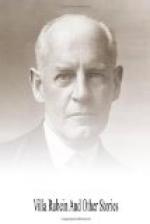“I was completely happy. When a man has obtained his desire he becomes careless and self-satisfied; I was watchful, however, for I knew that I was naturally a selfish man. I studied to arrange my time and save my money, to give her as much pleasure as I could. What she loved best in the world just then was riding. I bought a horse for her, and in the evenings of the spring and summer we rode together; but when it was too dark to go out late, she would ride alone, great distances, sometimes spend the whole day in the saddle, and come back so tired she could hardly walk upstairs—I can’t say that I liked that. It made me nervous, she was so headlong—but I didn’t think it right to interfere with her. I had a good deal of anxiety about money, for though I worked hard and made more than ever, there never seemed enough. I was anxious to save—I hoped, of course—but we had no child, and this was a trouble to me. She grew more beautiful than ever, and I think was happy. Has it ever struck you that each one of us lives on the edge of a volcano? There is, I imagine, no one who has not some affection or interest so strong that he counts the rest for nothing, beside it. No doubt a man may live his life through without discovering that. But some of us—! I am not complaining; what is—is.” He pulled the cap lower over his eyes, and clutched his hands firmly on the top of his stick. He was like a man who rushes his horse at some hopeless fence, unwilling to give himself time, for fear of craning at the last moment. “In the spring of ’78, a new pupil came to me, a young man of twenty-one who was destined for the army. I took a fancy to him, and did my best to turn him into a good swordsman; but there was a kind of perverse recklessness in him; for a few minutes one would make a great impression, then he would grow utterly careless. ‘Francis,’ I would say, ‘if I were you I should be ashamed.’ ‘Mr. Brune,’ he would answer, ’why should I be ashamed? I didn’t make myself.’ God knows, I wish to do him justice, he had a heart—one day he drove up in a cab, and brought in his poor dog, who had been run over, and was dying: For half an hour he shut himself up with its body, we could hear him sobbing like a child; he came out with his eyes all red, and cried: ‘I know where to find the brute who drove over him,’ and off he rushed. He had beautiful Italian eyes; a slight figure, not very tall; dark hair, a little dark moustache; and his lips were always a trifle parted—it was that, and his walk, and the way he drooped his eyelids, which gave him a peculiar, soft, proud look. I used to tell him that he’d never make a soldier! ‘Oh!’ he’d answer, ’that’ll be all right when the time comes! He believed in a kind of luck that was to do everything for him, when the time came. One day he came in as I was giving Eilie her lesson. This was the first time they saw each other. After that he came more often, and sometimes stayed to dinner with us. I won’t deny, sir, that I was glad to welcome him; I thought it good for Eilie. Can there be anything more odious,” he burst out, “than such a self-complacent blindness? There are people who say, ’Poor man, he had such faith!’ Faith, sir! Conceit! I was a fool—in this world one pays for folly....




